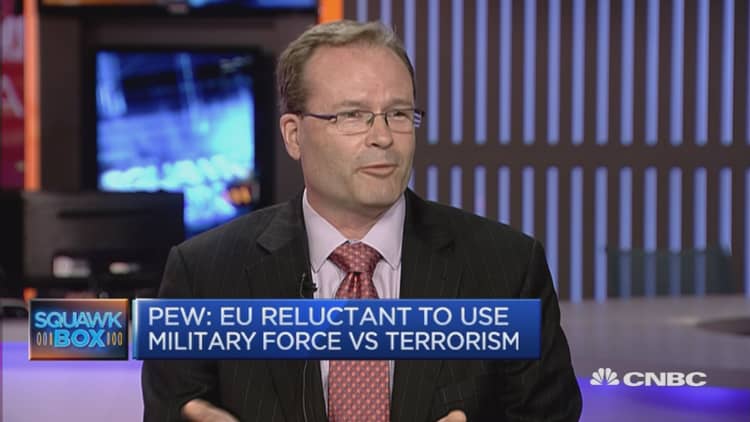
It may not just the British who are skeptical about the European Union. According to a poll from the Pew Research Center, many Europeans would rather focus on domestic issues and query whether obligations to allies should take precedence over their own national interests.
"There are so many questions about how Europe can act together collaboratively," James Bell, vice president of Global Strategy at the Pew Research Center told CNBC on Tuesday.
The U.K. is due to vote next week on whether it should stay or leave – Brexit – the European Union, with latest polls showing the 'Leave' campaign ahead. And according to Pew's 'Europeans Face the World Divided,' regardless of whether Brexit is voted through or not, 65 percent of the British public believes that some EU powers should be returned to the British government.
In fact, in seven of the 10 EU nations surveyed, half or more of the public believes their country should deal with its own problems.
"In the wake of prolonged economic stagnation, a massive influx of refugees, terrorist attacks and a strategic challenge posed by Russia, Europeans are weary – and perhaps wary – of foreign entanglements," said the Pew Research Center study published Monday.
The majority of Europe – which suffered from two major terrorist attacks in Paris and Brussels in the past year - see ISIS as the top danger to their countries, with the greatest concern coming from the Spanish (93 percent) and French (91 percent).
"The fear of threats seem to unite Europe," said Bell.
On the issue of refugees, there are sharp divides with people in Poland, Hungary, Greece and Italy much more concerned about the refugee crisis as a threat compared with those in the Netherlands, Germany and Sweden, said Pew.
Yet Europeans have a sense of obligation to help those in developing nations- in seven of 10 countries, half or more of the public supports increasing foreign aid.
There is also a big divide in how two of Europe's major powers – Germany and France- view themselves.
"The economy is key here. Germany really stands out, they are the ones that feel they're more important than 10 years ago," explained Bell.
On the other hand, a majority of French believe France has lost prominence on the world stage. More than half of Germans assert that their country should help other nations deal with their problems. A majority of French say their country should deal with its own problems first and let other countries fend for themselves, according to Pew.
In terms of international relations, most European countries "have noticed the rise of China but Europeans as a whole are still looking to the U.S. as a primary country that matters to their future," said Bell.

